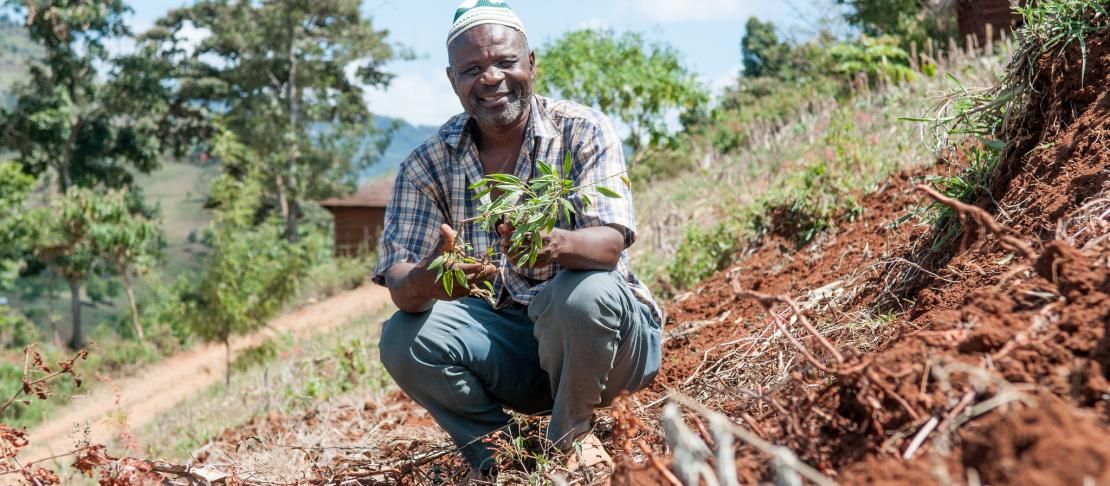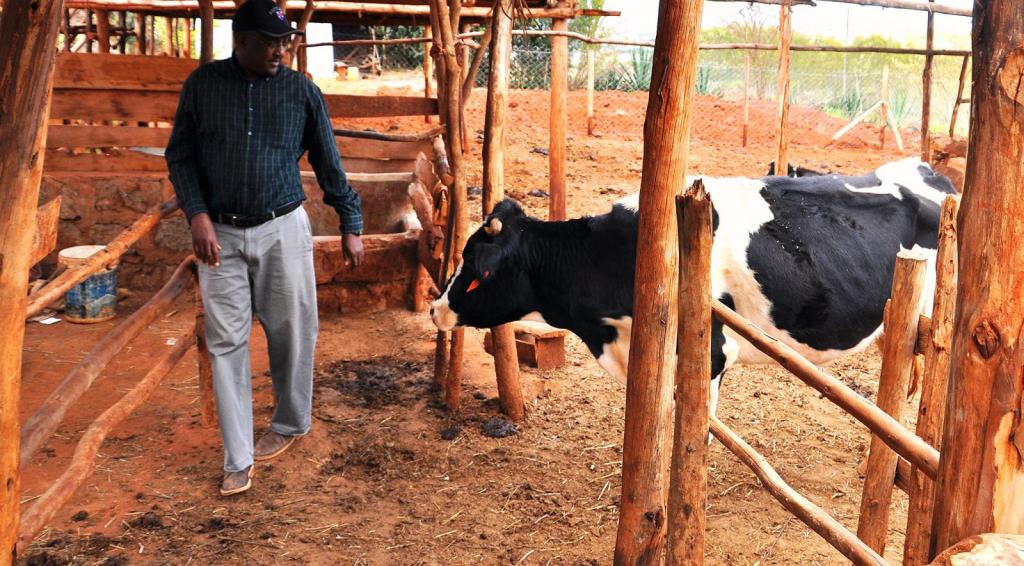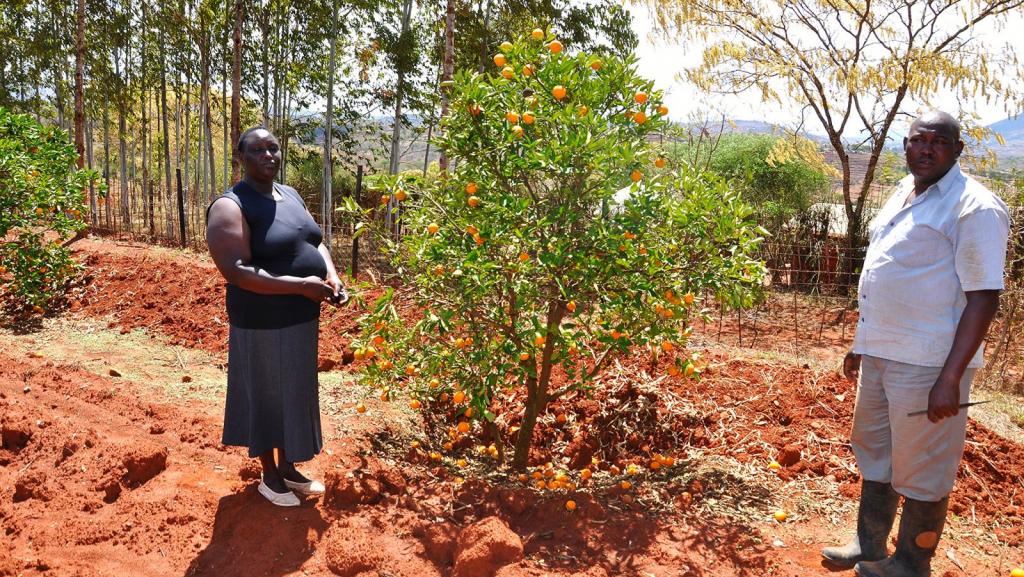Climate-smart agriculture lives and breathes among smallholders in Kenya

A video- and research project shows farmers in Machakos County Kenya implementing several climate-smart agriculture practices after watching the East African hit TV-show Shamba Shape Up.
Shamba Shape Up, a knowledge-based agricultural entertainment TV-show, has helped several smallscale farmers across East Africa adapt to a changing climate while boosting livelihoods and incomes. This has been possible through delivering information about climate-smart agriculture via an innovative concept: a dynamic presenter duo and agriculture experts that together with families conduct so called farm "make-overs".
The CGIAR Research Program on Climate Change, Agriculture and Food Security (CCAFS) theme ‘Linking Knowledge to Action’ decided to conduct a minor, but in-depth analysis of the TV-show's impacts in Machakos County, Kenya.
Here, Timothy Mburu, communication trainee, interviewed 18 farmers about their knowledge of and engagement with Shamba Shape Up, and which climate-smart agriculture techniques they had learned, as well as implemented, from the show (if any). The group also discussed whether or not they shared the information with fellow farmers, and what the show could improve further.
Five of the 18 farmers were selected for further in-depth interviews while being filmed. Their sessions have been captured in the video documentary: “How TV-program Shamba Shape Up influences Kenya's farmers to adopt climate-smart agriculture."
Background story: the collaboration with Shamba Shape Up
The theme has been partnering with Shamba Shape Up and Mediae, the company who produces the TV-show, for almost two years. Through working with Mediae, CCAFS hopes to better identify and reach male and female farmers interested in climate-smart agriculture information and practices.
This unique partnership links Mediae with several international agricultural research centres, including International Livestock Research Institute (ILRI), International Crops Research Institute for the Semi-Arid-Tropics (ICRISAT), World Agroforestry Centre (ICRAF) and International Potato Centre (CIP). The centers provide the latest agriculture and climate research results, while lending experts to the program where they show practical solutions to problems articulated by the farm families.
CCAFS wants to see thousands to millions of farmers adapt to an increasingly variable climate through adoption of ‘climate-smart’ practices. Through the two-year partnership, CCAFS has been able to reach many more farmers than otherwise possible with climate-smart agriculture information, this since SSU is aired to over 10 million viewers in the East African region. The show’s positive farm and financial impacts have been reviewed and confirmed through two separate assessment reports, one released by University of Reading, UK as recently as October 2014 (download both documents further down).
Farmers share their new climate-smart farming knowledge
Many of the interviewed farmers said that they had learned something new from Shamba Shape Up, and a few of them had also implemented the practices they had seen. The most popular climate-smart farming practices, that farmers mentioned either learning about and/or implementing, included methods of rainwater harvesting and micro-irrigation, improved dairy and poultry farming, seed and soil analysis, how to use manure more efficiently during and between planting seasons, and how to best plant trees in and around the farm, so called agroforestry.
Farmer Ann Kavuu said that through Shamba Shape Up, she had learned how to intercrop trees with crops. Anne has already managed to plant more than 200 of the Mukau tree on her plot, and has set a side a fairly large portion of her farm for future tree planting. She also learned that Briveria trees are important for nitrogen fixation, which is very beneficial for crops. Anne Kivuu said during her interview:
I have seen a lot of benefits around the agroforestry part of my farm. I believe my trees are helping my shamba (farm) to be different from other shambas around. Some seasons people didn't harvest anything, but there is not a single season I've gone without harvesting something. So I believe it is because of the trees that I have grown."
Mumo Mwendwa, a male farmer focusing on livestock and dairy production, said:
I have learned about dairy farming; that I should keep fewer cows that will give me more milk, than to keep many cows that will give less milk."

In the photo: Mumo preparing to feed his cows. Photo: T. Mburu
After both learning and using the dairy farming and tree planting tips from Shamba Shape Up, I have seen that my income has increased. My income can now pay for my workers, our electricity bills, and other small needs on the farm, said Mumo Mwendwa during his session.
Jemimah learned that the Fresian cow that she just bought wasn’t really suited for Machako's semi-arid climate. This helped explained the poor condition that her animal was in. She also learned how to vaccinate her cows against East Coast Fever, and how planting fruit trees, like mango and orange, could ensure an additional income and support adaptation to a more variable climate.

In the photo: Jemimah and her husband John around their orange fruit trees. Photo: T. Mburu
Knowledge sharing and further TV-show improvements
A majority of the interviewed farmers mentioned that they have in the past shared the information from the show with other farmers, neighbors and relatives, indicating that the climate-smart agriculture information is something that farmers seek and want. This frequent information sharing helps SSU reach people beyond its viewers.
The group also discussed how the show can improve further, mentioning that the program should air in the evenings instead, as more people would then be able to watch it. As of now, the TV-show airs around 15.00 pm on Saturday and Sunday when many are working in the fields. One farmer suggested that the messages of the experts featured on the show could be better translated, making it easier to understand and use on the farm.
Learn more:
- New Report: Assessing the Impacts of Shamba Shape Up (PDF)
- From 2013: Knowledge, Attitude and Practice (KAP) report for Shamba Shape Up (PDF)
- Blog: These are some of the impacts an agriculture TV-show can have
Cecilia Schubert works with communications at CCAFS and Timothy Mburu was a communications intern with CCAFS theme Linking Knowledge with Action.



